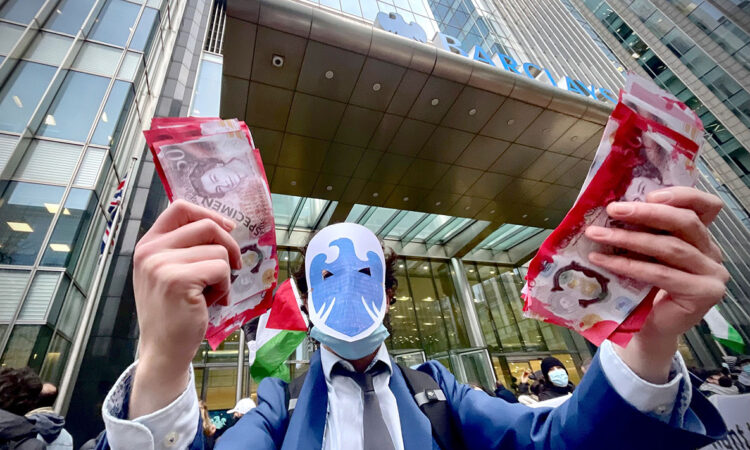
WHEN anti-war and solidarity activists blockade Barclays Bank they touch a deep-seated sense that this bank, and banks in general, are a malign force in the nation’s life.
Barclays, of course, has form as a prop to the South African apartheid regime so beloved of our ruling class and its political representative in the Tory government headed by Margaret Thatcher.
British banks, Barclays the first among this disreputable lot, are deeply involved in financing the illegal Israeli settlements that occupy Palestinian land and terrorise the Palestinians whose families have worked this land since time immemorial.
When the Palestine Solidarity Campaign showed that British banks are the sixth largest European creditor of the companies involved in these illegal settlements it led naturally to the demand, to be given powerful effect with tomorrow’s call to close accounts.
Weakening the customer base of banks is a sanction they understand. It is precisely the close integration of the banks with the other elements in the profit system — big business, the City of London conspiracy against the British people, the Bank of England and the vast assembly of companies that profit from our labour, the rents and mortgages we pay and the commodities we must buy in order to live — that makes bank boycotts such a valuable weapon.
This was demonstrated to great effect in the anti-apartheid campaigns of the 1970s and ’80s.
Last year it was revealed that 776 European financial institutions are involved with 51 companies linked to illegal Israeli settlements. British offenders include HSBC who provided £7.3 billion in loans as well as Santander, Lloyds and NatWest.
Of course, banks care nothing for Palestinian villagers and they care as little about our communities too.
Every High Street contains shuttered bank buildings, repurposed as charity shops or takeaways, that are testament to the great confidence trick perpetuated against working people that is online banking.
Just like the supermarket chains which make us work part-time as checkout assistants banks now force us to become unpaid online back office staff and bank cashiers.
Capitalism is crisis-driven to find ever more ingenious ways of extracting profit. Recruiting us as unpaid workers in the transactions that separate us from the wages from which our employers have already harvested surplus value is a true masterstroke by the exploiting class.
There are encouraging accounts that the Co-op Bank, which strayed far from its ethical origins when it was acquired by a private equity owner, is in talks that might result in its return to ownership as a mutuality enterprise.
This might increase the slim opportunities for customers to switch to a more ethical financial institution, a credit union or a mutually owned bank.
Co-ops, like credit unions and mutualities, are a good thing. The co-operative principle was pioneered by the working-class movement as a way to body-swerve predatory employers who compelled workers to use the company store and dodgy food manufacturers who adulterated the necessities of life.
Capitalist market realities limit on the challenge co-ops make to the profit system.
UK Government Investments is talking up the sale of the 35 per cent government share in NatWest acquired when the 2008 capitalist crash led to £46 billion of our money in a bailout.
A good idea would be for Labour to challenge the government to take the rest of NatWest into public ownership and use its £3,165 million profit as a springboard to extend popular control and ownership over the whole of the finance sector.
That would give a Labour government the tools for a green industrial investment programme well in excess of the £28bn scheme it has just abandoned.





